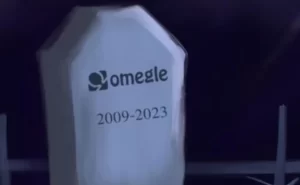Omegle’s Official Shutdown: A Decisive End for the Online Platform
Reader discretion is advised due to the sensitive nature of the topics discussed.
In the early internet’s wild west era, the world-wide-web was only getting bigger as time led to new diverting experiences! Omegle made its grand debut in 2009, being one of the earliest text and video-chat services available to the public. Omegle is known as an anonymous communication service, however, not all was safe and sound. There were numerous bad actors, criminals, and perpetrators roaming on the site preying upon innocent victims.
Omegle’s Founder, Leif K-Brooks, chose to close the site on Thursday, November 9th, 2023; shutting down after 14-years in operation. When K-Brooks was an 18-year-old college student residing with his parents, he launched the social networking site. Now and forever in the future, when visitors visit www.omegle.com; they’ll witness the lengthy farewell message on display. Archives of the chat website exist, and these screenshots attest those chaotic claims of unmoderated inappropriate actions and predatory behavior. It seems that no matter how many measures Omegle tried taking, it just would not stop under these mandatory restrictions.

When the site first launched, it was insanely popular for its novelty, however, it’d later become a can of worms. Parents were strongly advised not to let their children visit the website and to monitor internet activity closely as possible. The site ensures that all users by default are anonymous, but this can be disproven easily with advanced cybersecurity techniques. Omegle does not keep their online users safe, and in fact, users’ IP Addresses are revealed to other active users. This website uses peer-to-peer networking, which allows for two or more devices to connect directly to one another. It can be done without a central or intermediary server, and can be accessed by anyone.
For instance, a user outside of a chat/video conversation can intervene and collect those transcripts, screenshots, and personal information. Additionally, anyone with streaming software may be able to hijack users’ cameras and what the recipient sees on their end. For example, the digital hijacker could use a program like OBS, and aim at users’ target cameras during a call. Omegle is definitely not the first website to store IP Addresses, but most other sites wouldn’t have this publicly available.
Along with this, videos are captured depicting users committing intimate graphic acts in front of their cameras without their consent. Essentially, it’s identity theft; it’s likely these people have no idea they’ve been placed as an exhibitionist regardless of age. (If users do participate with the VCW, and so on, vice-versa.) These videos are known as VCWs, in which the controller manipulates the recorded content of the action buttons they possess. Those recordings are like digital puppets, cannot respond, and are intended to manipulate the clueless recipient unaware of the VCW. In this case since these bots cannot give a real auditory response, scammers turn to using Omegle’s messaging functionality instead.
Cases against Omegle increased and one of these cases involved a young woman, who sued the website in 2021. The woman, referred to as A.M., accused Omegle’s algorithm of matching her with a man who sexually exploited her. In A.M.’s lawsuit, she sought $22,000,000 USD in damages from the company. The text-video-chat website shut down two days after settling with her. Omegle, as promised, offered to pair people around the world, but unfortunately, they had zero control over their spontaneous algorithm. In spite of this though, users could press the ‘skip’ button at any given time at their own personal discretion.
Last year, Omegle filed over 608,000 reports to the National Center for Missing and Exploited Children. Additionally, Meta Platforms Inc. submitted 26,000,000 reports subject to online child exploitation and its controversial graphic content. The service, which allowed users to socialize with random strangers online, grew in popularity with youngsters during the COVID-19 pandemic. K-Brooks wrote that Omegle had state-of-the-art A.I. and moderator teams working behind-the-scenes to combat misuse of the platform. The website ensured bans to users, on the contrary though, if a user changed their IP/VPN; then it’d clear.
The founder insisted that despite users being anonymous, this never meant those being maliciously callous could hide from legal repercussions. The company has worked with agencies for these virtual criminal investigations “to help put evil-doers in prison where they belong.” The stressful expense of this fight— proved costly in the contemporary digital age where it’d no longer be considered sufficient.
Omegle’s Founder, Leif K-Brooks, said in his statement that operating the platform was “no longer sustainable, financially nor psychologically.” He stated that a war was being waged “against the internet” under the banner of child-safety. K-Brooks added, “Virtually, every online communication service [is] subject to the [same kinds of attacks] as Omegle, and while some are much larger companies with greater resources, [all] have their breaking point somewhere.”

Dania is the International Editor and she's a Senior. She translates articles bilingually to the website, adding a touch of creativity with a cherry on...



















Ms. Kearney • Nov 16, 2023 at 1:25 pm
Hi Dania,
This was super informative! I remember when I was a kid and Omegle had just recently come out. I was never allowed to go on (and never wanted to) for all the reasons you explained in the article. I definitely won’t miss its presence on the Internet.